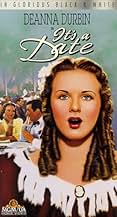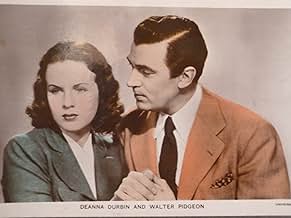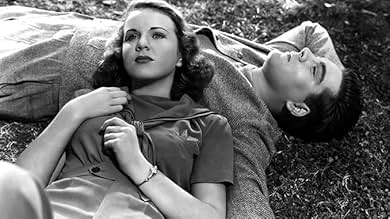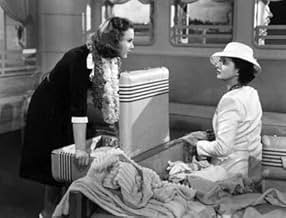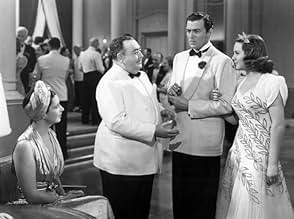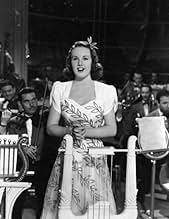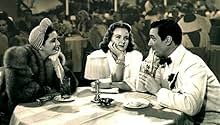Ajouter une intrigue dans votre langueAn aspiring actress is offered the lead in a major new play, but discovers that her mother, a more seasoned performer, expects the same part. The situation is further complicated when they b... Tout lireAn aspiring actress is offered the lead in a major new play, but discovers that her mother, a more seasoned performer, expects the same part. The situation is further complicated when they both become involved with the same man.An aspiring actress is offered the lead in a major new play, but discovers that her mother, a more seasoned performer, expects the same part. The situation is further complicated when they both become involved with the same man.
- Réalisation
- Scénario
- Casting principal
- Récompenses
- 4 victoires au total
- Ship's Steward
- (non crédité)
Avis à la une
This was the seventh movie Deanna Durbin made with producer Joe Pasternak and cameraman Joseph Valentine, and the well was running dry. This drivel would give anyone with an IQ above 70 a raging headache--even in 1940. It's a trite tale of a mother (Francis) and daughter (Durbin) in love with the same man (Pigeon) as well as mother and daughter vying for the same leading role in a Broadway play. It's nonsense with neither an ounce of plausibility nor a single bit of wit, though it fancies itself a comedy. The very contrived plot is arranged to provide Durbin with a ridiculous assortment of songs: "Musetta's Waltz" from La Boheme, Schubert's "Ave Maria," "Loch Lomond," and a bland new ballad, "Love Is All." Kay Francis was looking quite fine here, though the costume designer should have been shot for giving her unflattering turban hats.
This was the first American film that S. Z. "Cuddles" Sakall appeared in, though he didn't have his nickname at that time. He was playing the sort of part here that he played throughout his Hollywood career.
And the film reminded me of what an insipid actor Walter Pigeon was.
Deanna is fledgling actress Pamela Drake, daughter of major Broadway star Georgia (Kay Francis). She works in a small regional theater but unexpectedly gets the chance to star on Broadway herself. Seeking seclusion in order to prepare for her big break, she heads home to Hawaii to spend some time with her mother. On the ship, she meets pineapple tycoon John Arlen (Walter Pidgeon), who first woos her but then also becomes interested in mama. It turns out that Georgia also expects to get the part already offered to Pamela and also wants John. Who gets the part? More importantly for these types of films, who gets the man?
Durbin is amazing, as always, and really gets the chance to show what a child prodigy she was (though clearly becoming a young woman here). She sings several standards such as "Loch Lomond" and "Ave Maria" with her fine soprano voice, and shows maturity far, far beyond her years. If you aren't familiar with Durbin, be prepared to be dazzled by her talent. There's one fine bit where Deanna, trying to convince the big-time producers (including S.Z. Sakall doing his usual hammy bit) to hire her for their show, does several wildly different characterizations in rapid-fire succession which are all excellent. Great acting talent, great singing voice, prettier in a classic sense than Judy Garland, Deanna was the complete package.
Pidgeon is great also, but he is up against formidable competition in the acting department here. He exudes his usual avuncular charm, and actually has some dashing moments on the ship to Hawaii as he tries to woo Pamela. Later, though, he appears bewildered at times, despite supposedly being the one in charge. Kay Francis is the clear loser. She is completely outclassed by Durbin, and is clad in weird fashions such as turbans that make her look dowdy and out of place, especially in a Hawaiian setting. It is difficult to believe that Arlen would choose her over Pamela. Plus, she is given almost no chance to do anything but sit and wait for John and Pamela to decide things for her, so her character and motivations are murky.
Durbin gets to sing several times with her beautiful operatic voice, and she gets to emote repeatedly both as her own character and as the character she is playing within the story. Plus, she has several supremely Diva moments ("I am through with men!"), culminating in the glorious opportunity to stalk off in a huff, the battle won but the war lost. The reality, though, is that she is still just a kid playing in a grown-up world, a fight the real Deanna would be waging until she finally gave it all up and left films altogether later in that decade, hopefully for a happier life without the strain of constantly meeting her own and others' extraordinary expectations for herself.
Ignore the story, but don't ignore Deanna, a true star.
The plot involves aspiring actress Deanna being offered a part that was originally promised to her stage diva mom (Kay). Then, in Hawaii, the plot shifts to a romantic triangle as the two women grapple, not for a part, but for the attentions of a pineapple tycoon, Pidgeon, who's more interested in the mother. The inherent drama in such a situation is jettisoned in favor of standard Universal Pictures sitcom antics. Kay Francis overacts but is never given any good lines, forced too often to simply react to the bubbly, aggressive Deanna.
The first section of the film offers the flavorful ambiance of a theatrical milieu, both Broadway and regional theatre, but then, after Deanna's offered the part of St. Anne, the action shifts to a cruise ship, where Deanna meets Pidgeon, and finally to Hawaii where she reunites with Mom. Once Deanna boards the ship, she leaves behind her quirky boyfriend Freddy, an aspiring actor played by the funny Lewis Howard, who then disappears from the movie. Freddy has a great bit early on where he tries to impress a casting director by acting like a 'dope fiend' which is what he thought Deanna said when she told him to try out for the part of the Dauphin. He starts going into withdrawal tics, rubbing his nose and scratching his arms, a daring bit at a time when the Production Code strictly forbade drug references.
Norman Krasna's script (from a 'story' credited to three writers) offers plenty of bright dialogue and funny bits, but the shifts in setting make it play like three movies crammed into one. William Seiter's heavy-handed direction seems more intent on showing off the lavish (for Universal) sets and less on showing off the actors, giving a bloated feel to the whole enterprise. Deanna's earlier films were leaner, zippier and bursting at the seams with youthful energy. The soundtrack is short on original songs and big on choral standards: Deanna's big numbers are 'Loch Lomond' and 'Ave Maria.'
The plot summary revolves around Georgia Drake (Kay Francis), a successful Broadway actress just completing her 400th and final stage performance of "Gypsy Lullaby." In attendance are its producer, Sidney Simpson (Samuel S. Hinds) and his friend, Carl Ober (S.Z. Sakall), a playwright visiting from Vienna. In a separate balcony are Georgia's daughter, Pamela (Deanna Durbin), and her escort boyfriend, Freddie Miller (Lewis Howard). Ober is seeking for an particular leading lady for his upcoming production of "Saint Anne," and feels Georgia too old for the part. After meeting with Pamela, however, he finds she'll make the perfect Saint Anne. Awarded the title role, Pamela accepts, unaware that this is the role her mother is eager to play. With Georgia already vacationing in Honolulu, Pamela, knowing her mother to be her best acting coach, arranges to meet with her in Hawaii. While on board the ship, S.S. Honolulu, Pamela lives her part to the fullest by reading her script, thus, causing John Arlen (Walter Pidgeon), a businessman and fellow passenger, to mistake her for an extremely unhappy young girl. To keep her mind off her troubles, John pretends to be a stowaway hiding in a lifeboat and allowing her to assist him with food and water during the voyage. After the misunderstandings are resolved, situations occur as Pamela learns the truth about the Saint Anne play. To spare her mother's feelings, Pamela uses Mr. Arlen as the source to keep her mind off the play, followed by some unforeseen circumstances.
Other appearing in the cast include: Eugene Palette (Governor Allen); Henry Stephenson (Captain Andrews); Cecilia Loftus (Sara Frankenstein, Georgia's personal maid and no relation to the Mary Shelley novel character); along with the familiar faces of Charles Lane, John Arledge, Eddie Acuff, Fritz Feld and Virginia Brissac, among others. Because the Drake women are depicted as part of a generation of actresses, maybe Cecilia Loftus should have played the actress grandmother discussed in conversation rather than the personal maid to make this family generation of actresses more bonding and acceptable to the plot.
The musical program includes: "Gypsy Lullaby" (voice dubbed "sung" by Kay Francis); "Love is All"(sung by Deanna Durbin); Traditional Scottish song of "Loch Lamond," "It Happened in Kaola" (by Ralph Freed and Frank Skinner); "Hawaiian War Chant," "Rhythm of the Islands," "Musetta's Street Song" from the opera, LA BOHEME by Giacomo Puccini; and "Ave Maria" by Franz Schubert. Durbin's rendition to "Ave Maria" is beautiful, but her earlier effort, "Love is All" is one of nicest songs ever sung by her. Producer Joe Pasternak must have loved "Ave Maria" enough to use it again for Jane Powell's HOLIDAY IN Mexico (MGM, 1946), which also featured Walter Pidgeon, as well as the story for a remake, NANCY GOES TO RIO (MGM, 1950) with Jane Powell and Ann Sothern in the Durbin and Francis roles. Because of the Pasternak style and Pidgeon in the cast, IT'S A DATE could easily be mistaken for an MGM film rather than one by Universal.
Still a teenager of about 18 or 19, Durbin has developed into an attractive young lady. For the movie in general, 103 minutes is quite a drawn-out process in storytelling, thus, standing apart from Durbin's 87 to 95 minute feature film presentations. Yet, what makes it so watchable, other than Durbin's song interludes, are the veteran players as former Warner Brothers star, Kay Francis; the debonair Walter Pidgeon on loan-out assignment from MGM; and soon-to-be character actor for Warner Brothers, S.Z. Sakall. With this being Francis' only assignment opposite Durbin, she would later appear opposite Gloria Warren, a Deanna Durbin look-a-like songstress, in a Durbin-type musical drama, ALWAYS IN MY HEART (Warner Brothers, 1942). While Durbin's film career extended until her retirement by 1948, Miss Warren, following a few more screen roles for other movie studios, disappeared to obscurity by the end of the decade.
Due to the aforementioned MGM remake, the 1940 original was reportedly unavailable for viewing for many years until the wake of cable television where it turned up on cable networks as Showtime (1985), a decade later on Turner Classic Movies, and availability on video cassette in the 1990s. To the film's credit, IT'S A DATE offers more than its share with amusements, songs, and story in the finest Durbin-style tradition. (***1/2)
In Durbin's earlier films, I found her speaking voice high-pitched and a little annoying and her acting overly energetic to the point of being hyper. Here, she's delightful, bubbly without being manic, and she looks very pretty. Her singing voice has matured as well - she sings "Musetta's Waltz," "Ave Maria" and "Loch Lomond." The whole voice is richer though I will never be a fan of the way sopranos in those days were trained to back off of their high notes. She puts a little too much weight in the middle voice and therefore has a somewhat screechy Bb at the end of "Quando M'en Vo." Still, however, she is one of the best classical singers in film.
Though Durbin was a huge star at Universal, the studio never bought big properties for her. This is a nice film with good performances but that's about it. Kay Francis is lovely as Georgia and Loftus is funny as Sarah. The handsome Pidgeon does his usual good job.
Deanna Durbin in the end out-Garboed Greta Garbo, retiring at the age of 27 and moving to the outskirts of France, and I don't believe she's been seen since or even interviewed. The image and voice of the young girl live, and thanks to TCM, she undoubtedly has new fans. She deserves them.
Le saviez-vous
- AnecdotesS.Z. Sakall's American film debut.
- GaffesWhen John Arlen enters Pamela's room with her dress, she is fixing her hair and a hand mirror is on the vanity table close to the table mirror. But on the next cut, the hand mirror has changed position and is now partially sticking over the edge of the table.
- Citations
Karl Ober: I can't work in New York anyway. Is this place far from here?
Pamela Drake: Oh, no, Mr. Ober, it's only Maine. You know where Maine is!
Karl Ober: No.
Pamela Drake: Oh, it's practically a few minutes from here! You could write fine there.
Sidney Simpson: 'A few minutes'!
Pamela Drake: [to Sidney, blithely] Yes!
[to Ober]
Pamela Drake: That's all, really.
Karl Ober: [wagging his finger] Then it isn't quiet enough. I have to go further away from New York.
Pamela Drake: Oh, good - it *is* far away! Takes a whole day to get there.
[to Sidney, brightly]
Pamela Drake: Really, I'm an awful liar, aren't I?
Sidney Simpson: Yes.
- ConnexionsEdited into Gems of Song (1949)
- Bandes originalesLove is All
(1940)
Music by Pinky Tomlin
Lyrics by Harry Tobias
Piano: Cecilia Loftus (uncredited)
Sung by Deanna Durbin (uncredited)
Meilleurs choix
Détails
Box-office
- Budget
- 867 000 $US (estimé)
- Durée
- 1h 43min(103 min)
- Couleur
- Rapport de forme
- 1.37 : 1


